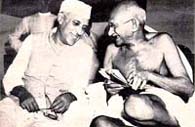A New Beginning
As part of our year-long look at fifty years of freedom, we have invited some of the bestknown
thinkers in this country and elsewhere to reflect on India's past and future. Rajni
Kothari points towards a new democratic alignment.
As we enter the last few years of this century and move into the
next millennium, the country seems to be in the throes of a series
of changes in both the structure and culture of political power,
the ground for which had already been laid before the end of the
half century of independent nationhood. These 50 years encompass
both a blossoming of the democratic enterprise that the country
had set its heart on and its gradual erosion and dissipation.
Historical change, however, cannot be described as a mere sequence
of ups and downs. Despite the steady erosion of both institutions
and the values that were cherished in the early decades after
Independence, much of what had started then is still part of our
national consciousness. The peculiar bland of creative nationalism
and persisting pluralism of indigenous society that had produced
India's democratic culture is still with us. It is still woven
into whatever remains of the institutional fabric of the polity.
These characteristics will continue to inform the emerging future
of democracy in India, even though the key actors and their social
bases as well as ideological moorings will change in some
basic ways.
 The problem with the first 50 years after Independence was that
while it should have been clear from the beginning that democracy
entailed a political process where the majority of the people should
be deciding the course of events, as also that notions of justice
and equity were inherent in the democratic idea and therefore
there was a necessary and compelling socio-economic logic to it,
the leadership (including Nehru and other 'founding fathers')
had failed to build into the scheme of things an egalitarian ideology
and a corresponding set of policies and programmes. This led to
a situation in which a small minority of people continue to dominate
the working of the polity and, over time, the politics of manipulation
and willful deceit got the better of the politics of fulfilling
the inherent logic of democracy.
The problem with the first 50 years after Independence was that
while it should have been clear from the beginning that democracy
entailed a political process where the majority of the people should
be deciding the course of events, as also that notions of justice
and equity were inherent in the democratic idea and therefore
there was a necessary and compelling socio-economic logic to it,
the leadership (including Nehru and other 'founding fathers')
had failed to build into the scheme of things an egalitarian ideology
and a corresponding set of policies and programmes. This led to
a situation in which a small minority of people continue to dominate
the working of the polity and, over time, the politics of manipulation
and willful deceit got the better of the politics of fulfilling
the inherent logic of democracy.
This having been the case, both the failure to live up to the
expectations of the people from the system, and the gradual erosion
and eventual undermining of the institutional fabric through which
these expectations were to be realised became inevitable. Failure
to build into the democratic edifice a set of ideological contours
necessarily resulted in steady decline and growing redundancy
of the democratic spirit. There were still a large number of individuals,
both within the confines of the system and pressing on it from
outside, who were keen to preserve the values of justice, equity
and democracy as spelt out in considerable detail in the Directive
Principles of State Policy of the Constitution. But in the end
they proved powerless (including those who happened to be 'in
power' whether in governments, in the running of the economy,
in diplomacy, in business or in the voluntary sector) and failed
to produce results. Inevitably, they got increasingly driven to
merely making rhetorical noises.
| 
